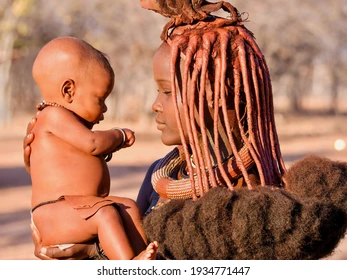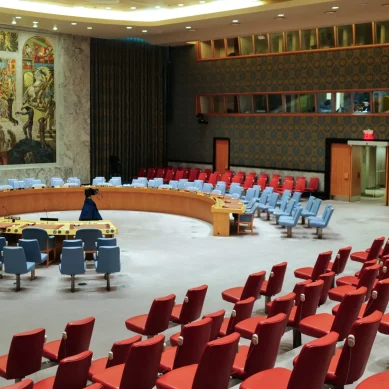
An impassioned and captivating debate is going on online regarding the date of birth of a child among Himba tribe of Namibia that defies the set norm – the day the child arrives in the world.
To the Himba, the date of birth is determined by the time the thought of a baby crystallises in the mother’s mind, which fuels her emotions for making love with her husband.
Himba are one of the many Bantu tribes found in Namibia, southern Africa. A controversial report on the cultures and customs of the Himba has been the subject of intense online debate by anthropologists since January this year with its defenders describing it as humanistic and an innate recognition of primacy of life by Africans.
Naturally, the controversy has sucked in the Caucasian cultural “supremacists” who see the Himba custom as decadent and “primitive”. On the moral front, Africans and other pro-life activists are holding the candle to the Whites, arguing that the custom is a point of reference for Black people’s reverence of human life. The argument flies in the face of a push by ongoing debate in America by pro-choice campaigners who are pushing for the right of a woman to procure an abortion.
The report, One Month with the Himba published by africageographic.com, says, “The date of birth of a child is fixed, not at the moment of his arrival in the world, nor at his conception, but long before: from the day he is thought of as a little boy or girl.”
Hitherto, the debate has always centred around conception and arrival of the child in the world, with reproductive health experts divided on when life starts. Prolife activists argue that life begins at conception and oppose the termination of pregnancy on that basis. Across generations and cultures, the date of birth has always been based on arrival of the baby in the world.
The Himba date of birth has, however, caught the attention of non-African, who see it as a “primitive custom.” The custom has elicited interesting views and reviews, with White describing it as fiction, while native Africans praise and support it as humanistic.
At the centre of the debate is whether the date of birth should be determined when the child comes out of the mother’s womb or the day the thought of a child occurred to a woman’s. However, this line of thinking presumes that a woman is married before she gets a child. The discussion also says little about outcomes of unwanted pregnancy, casual sex or rape.
The report gleaned from a Namibian publication says, “When a woman decides that she is going to have a child, she settles down and rests under a tree, listening until she can hear the song of the child who wants to be born. And after hearing this boy’s song, go back to the man who will be the boy’s father to teach him that song. And then, when they make love to physically procreate the child, they sing the child’s song, to invite him.”
The report adds that when the mother is pregnant, she teaches this child’s song to the village midwives and old women. So, when the child is born, the old women and the people around him sing their song to welcome him.
“As the boy grows, the other villagers learn his song. So, if the child falls or gets hurt, always find someone to pick him up and sing his song. Similarly, if the child does something wonderful, or successfully goes through the rites of passage, the townspeople sing their song in honour of him,” it reports.
The custom has a healthy dose of humour too. When children grow into adults and marry, the couple entertains each other with the songs during cohabitation. This age-old Himba custom has elicited strong reaction from White readers, who describe the tradition and determination of date birth as fictitious.
A British archivist, Maralyn Macvicar, responded thus, “This really moved me. What a beautiful understanding of the human condition! Sadly, it would seem that you are indeed correct. This story is actually a myth. I am, however, still grateful to have read this, as someone has described a practice (real or imagined) that speaks to my heart and in my opinion, would be a most beautiful custom and way of life.”
Among the tribesmen, the writer of the story, there is another opportunity when the villagers sing for the boy.
“If at any time in his life, the person commits an aberrant crime or social act, the individual is called to the centre of town (in traditional set up, a village) and the people of the community form a circle around him. Then they sing their song.”
The Himba recognise that the correction of antisocial behaviour does not pass through punishment, it is through love and a reminder of identity.
“When you recognise your own song, you do not want or need to do anything that could harm the other,” according to the report. “And in the same way throughout their lives. In marriage, the songs are sung together.”
The tradition has generated controversy with African readers pointing out the love with which an errant child is rebuked vis-à-vis the molestation meted out to children in the West defines humanism. In addition, when “growing old, this boy lies in his bed, ready to die, all the villagers know his song, and sing, for the last time.”
Edward Smith, a European cultural critic dismisses the story as codswallop and just good for reading. Smith terms it “a completely made-up story.”
“The Himba themselves are still about,” observes Smith, “but this made-up lump of codswallop has nothing to do with how they live and many of the men take non-traditional jobs. The women still live pretty traditionally.”
At some point the debate turns racist and a little condescendingly stereotypical with eastern European Vajn Tyatsmir, saying, “Well yeah, when women are treated as property and are often married off at the age of 10 for cattle, and then usually undergo genital mutilation. And then are usually beaten very often. In western cultures, we call this child molestation.”
According to Smith, “It might be a beautiful custom if it worked. I rather doubt it works. Thanks for telling us though!”
However, Nigerian Adesina Adesegun, scoffs at the child molestation tag, observing sarcastically, “And of course in your Western culture adults don’t molest children? The kind of child molestation that goes on in the West are taboo in the ‘Primitive’ societies!
It is the same line of argument another reader who identifies himself as Ryan Silva C advances. “Absolutely. And some faiths think they need to be civilised and baptised,” says Silva.
He however defends Western culture with regard to child molestation. “That is very wrong in Western culture. Why would you think that it is socially acceptable in the West? Your hatred for Western civilisation is showing! Molesting a child is very much illegal in the West as it should be anywhere.”
Jill Friedman acknowledges the existence of extreme child abuse in the West. Freidman explains, “Illegal, but it happens in the West and is tolerated. That was his point.” But Howard Miller is nonchalant, saying: “I’m pretty sure there haven’t been any primitive societies for at least 100,000 years.”
Adesegun clarifies, “Hatred? Not for Western culture in its entirety, just the hypocritical part. Judging all and sundry by Western standard. The Western focus on materialism and individual personal freedom above all else is not the only possibility for human happiness!”
- A Tell report











